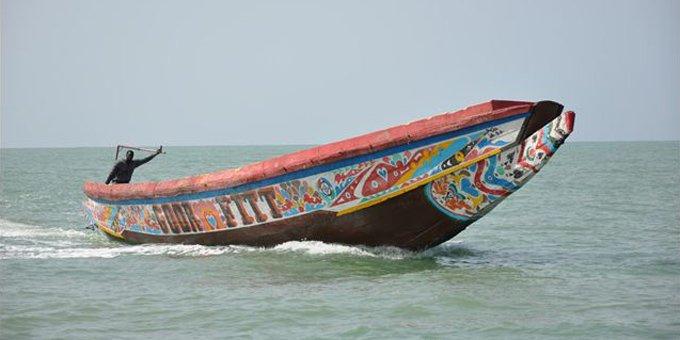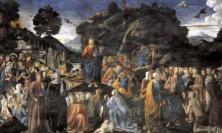Director: Moussa Touré
Starring: Souleymane Seye Ndiaye, Laïty Fall, Malamine Dramé, Balla Diarra, Salif Jean Diallo
Certificate: TBC (87 mins)
A ‘pirogue’ is a simple, low-lying, wooden, open fishing vessel, often brightly-coloured and used traditionally for coastal fishing off Senegal. Increasingly, they have simple engines attached to allow the fishermen to pursue the fish into deep waters; an economic but very dangerous necessity due to overfishing off West Africa.
The film, La Pirogue, was also full of local colour and was at heart quite simple in its premise. Despite its shortcomings, it managed to capture the immediacy of a grand drama writ large in the daily lives of many people in West Africa; the drama being whether or not to risk the open seas in a pirogue, in order to get to Europe and the chance of a better life.
The few shortcomings lay in the lack of depth to the characterisation, a rather predictable storyline, and perhaps trying to fit too much into too short a time. It was difficult to sympathise with the characters, because we did not get to know them particularly well. But then that was probably just as well as so many of them inevitably died. The end dedication of the film in some way says it all: it is dedicated to the estimated 5,000 people who have died trying to get to Europe by pirogue, a staggering one in six of those who have attempted the crossing.
The director, Moussa Touré, dealt with a difficult subject sensitively by opening a window into the lives and motivations of several characters: a traditional fisherman, his brother caught up by the attractions of modern living and the opportunities in Europe; a group of Guineans who have never seen the sea before; a young woman who stows away in the hope of trying to bring about a better life for her two children; the fixer who has found the full complement of passengers; the backer of the enterprise who pays the captain and provides the boat.
In what is a relatively short film, not much can occur by way of character development for such a large cast. Nor does the storyline hold any surprises. But that is not the point. Moussa Touré’s aim seems to be to explain the phenomenon of such desperate migration routes and to expose the lives behind the migrants at sea. In that he is successful. And he manages it without any moral gloss.
He presents a stark reality: a tension between traditional cultural values and the modern world with all its consumerism; the question of what a fisherman is to do when there are no more fish left; differences in religion and background with all the tensions this provokes in a very small open fishing vessel surrounded by a vast ocean; the lack of local opportunity confronted by the wealth of expatriates who have made it in Europe and sent back enough money to build large houses. Add into the mix the inevitable tensions of a stowaway who is perceived to have stolen a passage that the others have worked hard to get the money for, and that stowaway being a woman amongst 30 men.
Some moral questions are raised, such as what to do when they come across another pirogue which is adrift in the ocean? Bigger questions are alluded to in the tensions and misunderstandings between those who follow their faith dutifully and those who do not, and between the different cultures present; and in the obvious wealth of the backer of the trip, who has become wealthy without leaving Senegal and without facing the risks of the journey. Reality is presented without any moralising. It is left to the viewer to make up his or her own mind.
Few of the 31 migrants we focus on survive despite the odds. The pirogue has been buffeted by a storm. The handheld GPS has been lost. The engine fails leaving them adrift. All their supplies have been washed overboard or ruined in the storm. Many of the migrants have succumbed to illness, fear, exposure. The few left, at the edge of death are found and rescued by the Spanish Red Cross, taken to the Canary Isles then repatriated eventually.
I did enjoy the film – despite the melodrama and subject matter – mainly because it was handled so sensitively and was full of an immediate energy. It had a sense of authenticity about it. I am sure that many Senegalese will know of people who have travelled to Europe by pirogue, and will know of people who have perished on the journey. Moussa Touré and others will know of the discussions and the background to why people are prepared to undergo such danger in search for a better life. Through this film he has been able to share some of that with the rest of us and to leave us to make up our own minds regarding the merits of such a course of action.
Louise Zanré
![]() Visit this film's official web site
Visit this film's official web site






